This piece is part of the Center for Middle East Policy’s Israel-Gaza interviews series, in which leading experts unpack the conflict via in-depth Q&As.
The French government's response
KEVIN HUGGARD:
How has the government of French President Emmanuel Macron responded to the present Israel-Gaza crisis? Does this represent continuity or a departure from France’s past approach to Israeli-Palestinian affairs?
TARA VARMA:
In a speech on October 12, five days after Hamas’s attack, Macron asserted Israel’s right to defend itself and urged for a strong and fair response in an address to the nation. He was immediately criticized for being too pro-Israel and for breaking from Paris’s traditional position of being comparatively more receptive to the Arab states’ concerns than elsewhere in the United States or Europe.
However, in light of an intense French internal debate and worldwide discussions — notably in the so-called Global South — on Israel and Gaza, Macron tilted back toward a more even-handed approach. For example, when he visited the region more than two weeks after October 7, Macron was among the leaders who met with Israeli Prime Minister Benjamin Netanyahu, but he was also the first to visit Palestinian President Mahmoud Abbas in the West Bank. Likewise, as we saw recently, Macron’s exhortation for the Israeli government to clarify its objectives in the Gaza Strip is another indication of his willingness not to take sides.
Macron’s declarations come as France’s policies toward the Arab states are being particularly scrutinized by its Jewish and Muslim populations. Indeed, in the 1967 Six-Day War, France shocked Israel by choosing the side of the Arab states. In the 1990s, France condemned Iraq’s invasion of Kuwait and then spearheaded the antiwar movement in 2003 before the United States invaded Iraq. This is not to say it was anti-Israel, but it did try to play a balancing act.
Macron is prone to wanting to speak to both camps — he theorized this strategy in his first campaign and applies it to both domestic and foreign policy. The risk here is by trying to balance, he ends up being unclear about his own goals.
Macron’s stance on the war
KEVIN HUGGARD:
Politico, among other outlets, has reported on leaks of anonymous critiques by French diplomats of Macron’s stance on the war. Is this rare in French foreign policy? Is there a consensus view on what position France should be taking within its government or policy community?
TARA VARMA:
It is rare for French ambassadors in the region to formulate their concerns in such a letter, though it has happened before. In this case, the letter lamented a departure from what it calls France’s traditional position on Israel-Palestine, which is meant to be balanced, more receptive to the “Arab street,” and at odds with the most trans-Atlanticist and pro-Israel voices within the Ministry of Foreign Affairs. The signatories of the letter denounced what they perceived as France’s alignment with Israel and raised concerns that Macron’s stance might put France’s security at risk.
Younger diplomats, in particular, were dismayed by the president’s recommendation to create an anti-Hamas international coalition that mirrored the anti-ISIS coalition in Iraq and Syria. The proposition wasn’t discussed internally at the Foreign Ministry, and in the face of general protest and uproar, notably from the Arab states, it was ultimately abandoned. This is yet another example of the Macron method at work. The French president is very intent on disrupting strongly held positions whenever he can by rocking the boat and getting his colleagues to think differently on any given issue. But it also means that French diplomats often discover his proposals rather abruptly. If the Macron method sometimes helps move the debate forward in France, it generally doesn’t play well with European partners. It certainly didn’t play well with France’s Arab partners and his own administration this time.
Macron now says his focus on the ground is three-fold: fighting terrorism, pushing for humanitarian aid, and resuming political discussions with the two-state solution in mind. On the sidelines of last month’s Paris Peace Forum, Macron hosted a humanitarian conference for Gaza where he called for humanitarian pauses and preparation for a cease-fire. He pledged that France would increase its aid to Gaza from €20 million to €100 million (approximately $21 million to $108 million). Participants’ overall pledges were supposed to have topped €1 billion ($1.1 billion), though figures still need to be confirmed.
What Macron’s behavior and positioning reveal is that there is no consensus in France on this issue. The country finds itself torn over it, and the very fact that it is hard not to be assigned to one camp or the other makes the government very wary of taking any foreign policy action that could spark tensions inside France itself.
The EU's role in diplomatic efforts
KEVIN HUGGARD:
Do you expect the European Union to be able to play a significant part in diplomatic efforts going forward, or is it limited by its internal divisions on this issue?
TARA VARMA:
Europeans share their American partners’ concerns that the Israel-Gaza conflict could spillover across the region, notably with Iran. However, Europe has been long divided over developments in Israel and the Palestinian territories. In the October 2023 European Council communique, the EU condemned Hamas’s attack on Israel and reiterated Israel’s right to defend itself. It also expressed the “gravest concern” for the situation in Gaza and highlighted the need for humanitarian access. It took hours to produce these seemingly reasonable results, due to major dissensions inside the EU on the crisis.
The EU’s divisions were laid bare at a vote on a United Nations General Assembly resolution at the end of October. The resolution urged Israel to implement a humanitarian cease-fire but didn’t call out Hamas for its attack. In the breakdown of votes coming from Europe, three camps emerged: Belgium, France, Ireland, Portugal, and Spain, among others, voted for the resolution; Austria, Croatia, the Czech Republic, and Hungary voted against; Germany, Italy, and the Netherlands counted among those who abstained.
These divisions predate the reignition of hostilities. There are different national debates in Europe, and it has always been quasi-impossible to overcome them. The Netherlands, which deported hundreds of thousands of its Jewish citizens during World War II, alongside Germany have been the most vocal about Israel’s right to defend itself. Ireland, which sees itself as a postcolonial state, has positioned itself on the other end of the political spectrum by underlining the plight of the Palestinian people. France, with the largest Jewish and Muslim populations in Europe, generally finds itself in the middle of this debate.
In a meeting in Spain on November 27, EU foreign affairs chief Josep Borrell indicated that the Arab states and the European Union agreed that a two-state solution was the answer to the Israeli-Palestinian conflict. Borrell added that the Palestinian Authority should lead Gaza, and he called for elections to be held as soon as possible.
In a situation where Europeans feel powerless and have long struggled to find a common position, their leaders and decisionmakers are now in agreement that Israel has the right to defend itself but that it must comply with international law in Gaza. However, they are not in a position to be honest brokers on the crisis, and they are being accused of a double standard because of their inconsistent policies on Russia’s invasion of Ukraine and the Israeli-Palestinian conflict.
The conflict's role in French domestic politics
KEVIN HUGGARD:
What role does the Israeli-Palestinian conflict occupy in French domestic politics?
TARA VARMA:
Traditionally, foreign policy doesn’t play a major role in French domestic politics. The makeup of the French Constitution gives the president considerable leeway in setting the country’s foreign policy agenda. France is an outlier in Europe, as it doesn’t need parliamentary approval for any major foreign and security policy decision. This has tended to create a vacuum in the political debate, with parliamentarians, even those who are members of the National Assembly and Senate’s foreign affairs and defense committees, solely speaking French and having a comparatively low level of interaction with their European counterparts.
The Israeli-Palestinian conflict presents us with a different perspective. Hamas’ horrifying attack on Israel on October 7 and the increasing death toll in Gaza has led many European publics to demand more action from their decisionmakers. That is especially true in France, as Paris was yet again the victim of a terror attack in early December when a man diagnosed with psychiatric disorders killed a German tourist and injured several others. He told the police he was “upset over the deaths of Muslims in the world, including in Gaza.”
Since October 7, France has experienced over 1,500 antisemitic acts — a major spike amounting to more than three times the number of antisemitic acts in all of 2022. The government reacted promptly in denouncing these acts, however, members of the French Jewish community indicate that they don’t feel safe in their country anymore. The French interior minister also acknowledged a rise in anti-Muslim acts in the country since October 7, in particular with mosques being defaced. TV pundits also made anti-Muslim comments in their shows, prompting Macron to declare that the way “to protect French people of Jewish faith should not be to pillory French people of Muslim faith.”
Because France has Europe’s largest Jewish and Muslim communities in Europe, the debate around Israel-Gaza resonated differently than elsewhere in Europe. Yet, similarly to other European countries, it has led to divisions on the left with La France Insoumise’s (LFI) Jean-Luc Mélenchon attributing responsibility for the October 7 attack on Israel’s occupation of Palestinian territory. The left-wing coalition that LFI is part of is already in tatters; current developments in the Middle East might be the last nail in the coffin.
Macron was heavily criticized inside and outside his party for not attending a demonstration against antisemitism in November that gathered over 180,000 people. He justified it by saying that he hadn’t attended any such public demonstration in the past, but former presidents such as François Hollande and Nicolas Sarkozy were present while other presidents have attended such demonstrations while they were in office.
Macron was again in the eye of the storm when he hosted a ceremony during which candles for the Jewish holiday Hanukkah were lit in December 2023 at the Elysée, the presidential palace, in what his critics denounced as a violation of the principle of secularism. Laïcité, the French version of secularism, is a series of principles that are supposed to manage the role of religion inside society. From a legal standpoint, laïcité is understood as the constitutional principle that separates political power from religious organizations. It has become increasingly contentious in France, and the Israeli-Palestinian conflict makes it resonate even more inside French society.
France's role in the conflict
KEVIN HUGGARD:
What role do you think Macron and France would like to play in diplomatic efforts to end the present fighting and establish a post-conflict settlement? What do you see as the most likely and/or constructive French role?
TARA VARMA:
Macron is conscious that France alone cannot play a key role in the current diplomatic efforts. He knows that an international consensus is needed, and that the role of the United States remains central. His objectives of fighting terrorism, pushing for humanitarian aid, and resuming political discussions to advance a two-state solution are shared by other EU member states.
One more key feature of a Macronian foreign policy is the en même temps — literally translated as “at the same time,” and meaning doing two different things simultaneously. In this case, it appeared initially that Macron had adopted a more pro-Israel line over a more pro-Arab French diplomatic position. He is now doing both: saying that Hamas needs to be condemned for the October 7 attack while asking Israel for clarity on its goals in Gaza, as the death toll rises, and the international community increasingly expresses its concern. France voted in favor of a U.N. General Assembly resolution for a cease-fire as well as in a vote by the U.N. Security Council on December 8, 2023, while the United Kingdom abstained and the United States vetoed.
Concerns of shifting U.S. priorities?
KEVIN HUGGARD:
In the United States, President Joe Biden has sought to tie U.S. support for Israel against Hamas to U.S. support for Ukraine against Russia. Do you see concern in France or Europe more broadly that a U.S. foreign policy newly focused on the Middle East may place less of a priority on the Russia-Ukraine war?
TARA VARMA:
The concern in Europe is not so much with the current administration focusing more on the Middle East. There is a consensus that massive efforts are necessary to find a resolution immediately and prevent an escalation in the region. This outcome matters first and foremost in the Middle East, but it will also be central in Europe.
What worries Europeans is that a different U.S. administration in 2024 would steer the United States differently, not only in the Middle East but also in Ukraine. However, the U.S. Congress’s current difficulties in passing the supplemental budget for Ukraine and Israel are already raising alarm bells. Europe and the United States will have to make a special effort to fight against the fragmentation of the international order — especially as Russia and China have been very intent on pitting what they see as one geopolitical bloc (the West) against others (i.e., “the Rest”). Europe and the United States can still appeal to the countries of the Global South by explaining that they stand for international principles and international law, and that this applies to both conflicts.
The Brookings Institution is committed to quality, independence, and impact.
We are supported by a diverse array of funders. In line with our values and policies, each Brookings publication represents the sole views of its author(s).

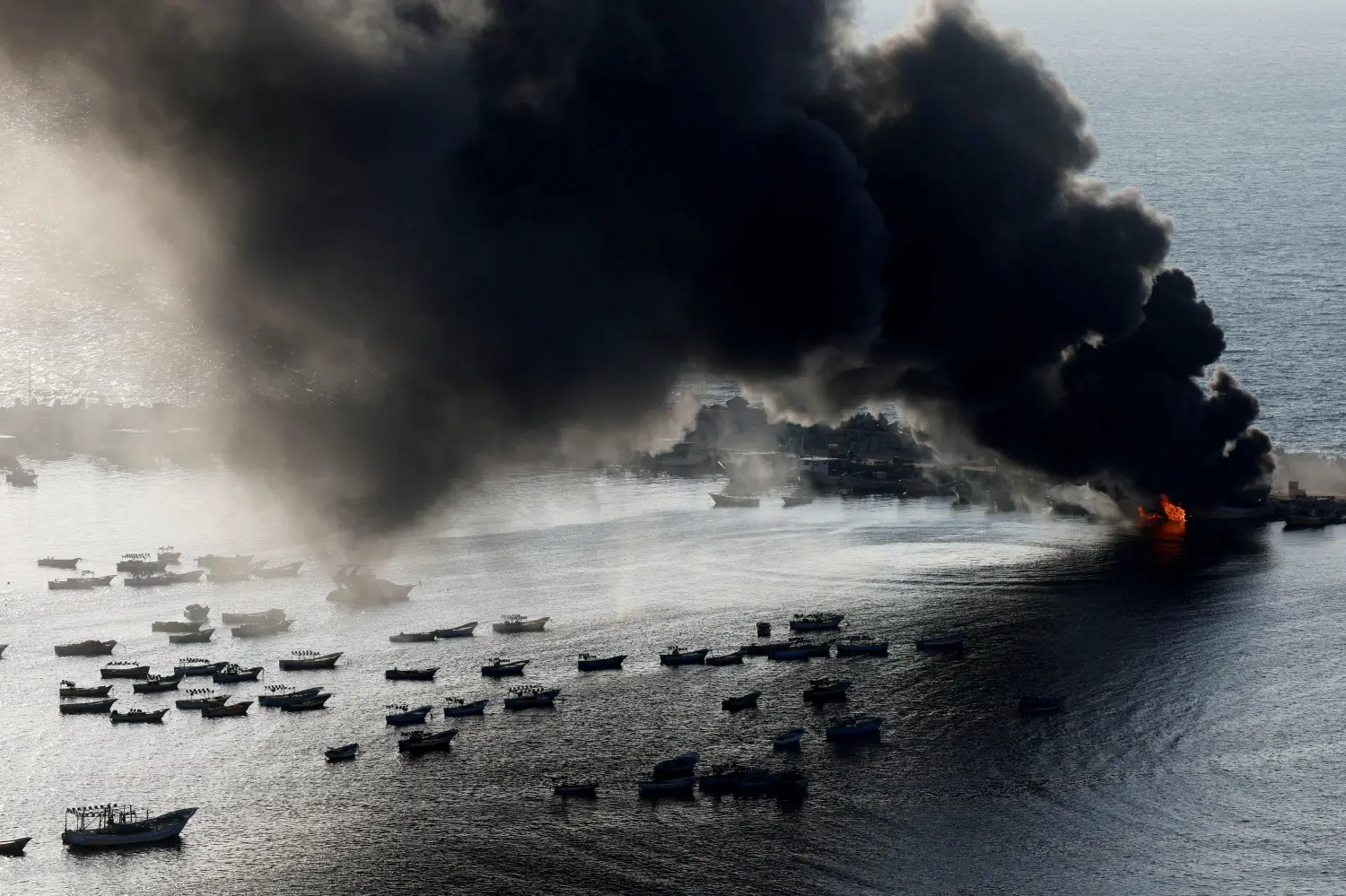

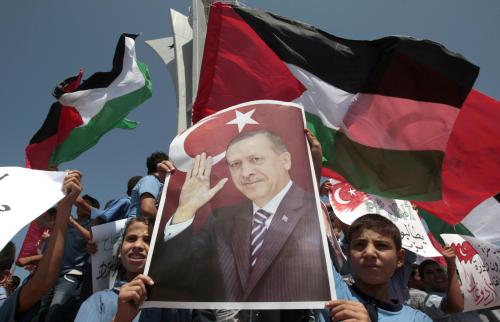

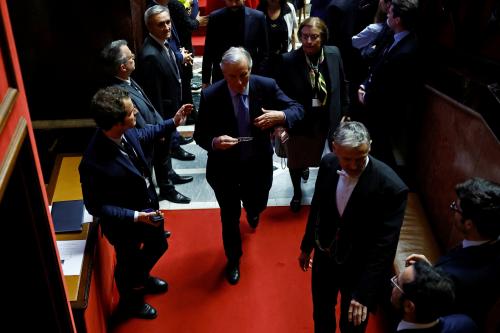
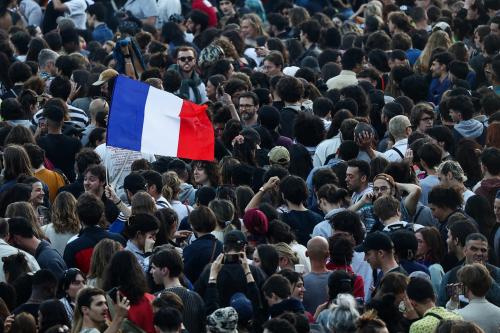
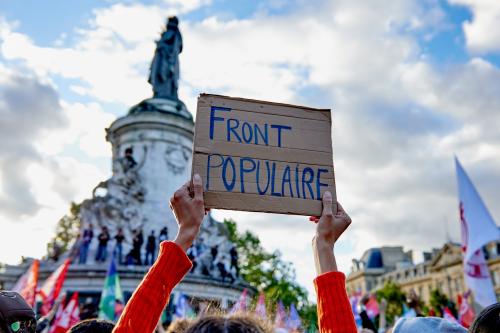
Commentary
France responds to the Israel-Gaza crisis
December 15, 2023